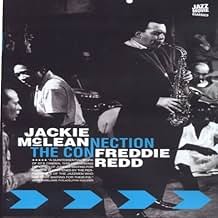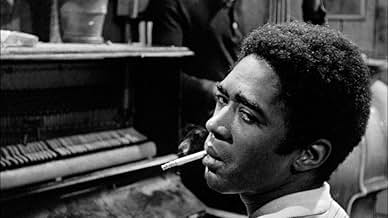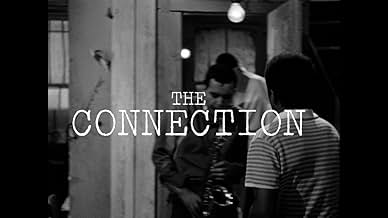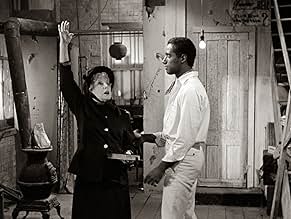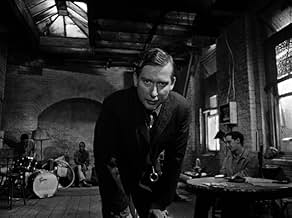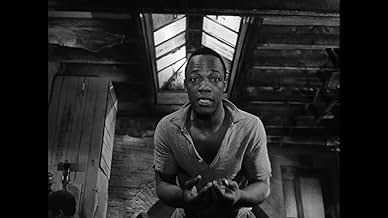IMDb रेटिंग
7.0/10
1.1 हज़ार
आपकी रेटिंग
अपनी भाषा में प्लॉट जोड़ेंMen sent their own way await heroin in Leach's apartment.Men sent their own way await heroin in Leach's apartment.Men sent their own way await heroin in Leach's apartment.
Jerome Raphael
- Solly
- (as Jerome Raphel)
Jim Anderson
- Sam
- (as James Anderson)
Roscoe Lee Browne
- J.J. Burden
- (as Roscoe Browne)
फ़ीचर्ड समीक्षाएं
This is an arthouse drama about a group of heroin addicts hanging around an apartment in Harlem, waiting for their connection to arrive with the day's fix. The characters monologize about their pathetic lives, while a few of them play jazz music. The film is presented as a documentary being filmed by a director (William Redfield) and his cameraman (Roscoe Lee Browne, in his debut). Featuring Warren Finnerty, Jerome Raphael, Jim Anderson, Barbara Winchester, Henry Proach, and Carl Lee. Shirley Clarke directed this film version of a play which structurally resembles the later mockumentary genre, only without the humor. The subject matter and the presentation ensure that this will have little appeal outside of the arthouse crowd, as most audiences will find this tedious, self-indulgent and of minimal entertainment. I applaud the effort and the intent, but the end product isn't something I'd want to revisit.
And what a stupid comment by a previous viewer. "Are all jazz musicians heroin attacks?" C'mon, there isn't a trend here, and perhaps you don't like jazz because you have no taste in music. Anyway, Shirley Clarke's cinema verite'style is put to the test , as we witness some sleazed-out New Yorkers in their subterranean dwelling, as they await their heroin "connection" -the mysterious Cowboy, played by Clarke's real-life lover, Carl Lee.
I'd like to clear up this jazz/heroin confusion (ignorance) that may stop you from watching this great film. Leach is the connection to Cowboy, and Cowboy is the connection to a dealer. The IMDb plot summary says that Cowboy is bringing "the connection" back to Leach's house, but he is really just bringing heroin. The fact that some of the people waiting for heroin are jazz musicians doesn't mean all jazz musicians were addicts, although most of the good ones were. With that said, I would advise any bee-bop fan to watch this film just for the amazing, and sole, footage of Blue Note heavies Jackie McLean and Freddie Redd. You will most likely also like the free-jazz directorial treatment of what was originally a stage play. The film also deserves credit for it's honest portrayal (in 1961!) of heroin addiction, neither glamorizing nor condemning it. The only problem I had was the slightly over-theatrical styles of some of the actors. Overacting did become the Leach character, however: "OHHH, MY BOIL!!!" If you liked "The Incident" or "The Pawnbroker," you'll like this one.
A remarkably tense and anxious little film about a group of junky musicians "waiting for their man" in a New York flophouse loft. They're joined by a documentary film crew (just a director and a cameraman) whose goal seems to be some sort of cinéma vérité about the life of junky musicians who wait in flophouse lofts.
After a few introductions, and comical "act natural" type instructions from the documentary director, the characters take turns addressing the camera. They nervously rant, philosophize, and insult each other, interrupted occasionally by improvised jazz from several legitimate musicians in the cast (most notably pianist Freddie Redd and tenor sax player Jackie McLean). The anxiety they feel as they wait for their fix is brilliantly conveyed by both the actors and the director (this time I mean the real director, Shirley Clarke, not the actor portraying the documentary director, got it?)
Much of this conveyed anxiety comes from the fact that the film is a strange and slightly unsettling mix of stark realism and stage acting (it is a filmed version of a play from the New York theater scene of the day). This is an unusual film and it honestly takes some getting used to, though probably less now taking into account the glut of nauseatingly self-conscious "mockumentaries" and hyper-stylized "reality shows" we are plagued with today.
The Connection is something different, matching edgy subject matter with edgy film-making the producers were working very much without a net. Consequently some might think it ends in disaster, I think it's a highly interesting experiment that's well worth watching.
After a few introductions, and comical "act natural" type instructions from the documentary director, the characters take turns addressing the camera. They nervously rant, philosophize, and insult each other, interrupted occasionally by improvised jazz from several legitimate musicians in the cast (most notably pianist Freddie Redd and tenor sax player Jackie McLean). The anxiety they feel as they wait for their fix is brilliantly conveyed by both the actors and the director (this time I mean the real director, Shirley Clarke, not the actor portraying the documentary director, got it?)
Much of this conveyed anxiety comes from the fact that the film is a strange and slightly unsettling mix of stark realism and stage acting (it is a filmed version of a play from the New York theater scene of the day). This is an unusual film and it honestly takes some getting used to, though probably less now taking into account the glut of nauseatingly self-conscious "mockumentaries" and hyper-stylized "reality shows" we are plagued with today.
The Connection is something different, matching edgy subject matter with edgy film-making the producers were working very much without a net. Consequently some might think it ends in disaster, I think it's a highly interesting experiment that's well worth watching.
Regular readers of my comments know I study folding, and I suggest that it is a deep concern for many filmmakers going back many decades. Most of my viewing these days comes from reader suggestions.
This is one, and very interesting. Group it with "The Saragossa Manuscript" as an early experiment, probably influential. Crude and obvious, but of historical interest.
I will describe it because it is hard to find.
Ostensibly it is a documentary drama, filmed of then contemporary jazz musicians (man, dig?) in a seedy apartment. They are there for their pooled money to turn into a pooled high, then pooled music. The thing is framed by a device: the film is made by two people, the director and a photographer. During the film, the director has his first hit of heroin, and presumably succumbs to it thereafter. The movie starts with a statement by the photographer that the director has abandoned the project and he (the photographer) has assembled it for us.
In what we call the real world, this is a play about this film-making. So to begin, it is a film about a play (a very obvious play) about a film about a "real" drama. A theory of theater at the time was that such abstraction and acknowledgment of the medium would allow the form of the reality to shine through.
It is the theatrical equivalent of an architectural notion that you can see in the Paris Museum called Pompidou, where all the structure is more than exposed, exposed in a way so obvious it is supposed to be invisible.
You may buy this. I certainly did when I was an architect in this era until I actually designed a building using it.
The difficulties of making this work are enormous.
You can see those problems here. Cowboy is the agent who brings the high. He arrives in pristine white, an articulate black man who used to be a musician and now is a savior. He brings an old woman, a salvation army warrior from 70 years earlier, incidentally 70 years old and worried about her burial.
For this, you need extremely clean images, touchstone dialog (where you jump from pad to pad without muddying yourself), and actors who understand all the folds and can inhabit them all.
This has none of that. These are street performers after the manner of "The Living Theater" which eschewed just the kind of thinking this project demands.
What we end up with is a bunch of actors with empty lives without layers who give us a layered story about a bunch of musicians with empty lives because they left layers behind.
You'll probably want to watch "Hurly Burly" for something like this done well, or this for historical interest.
Ted's Evaluation -- 2 of 3: Has some interesting elements.
This is one, and very interesting. Group it with "The Saragossa Manuscript" as an early experiment, probably influential. Crude and obvious, but of historical interest.
I will describe it because it is hard to find.
Ostensibly it is a documentary drama, filmed of then contemporary jazz musicians (man, dig?) in a seedy apartment. They are there for their pooled money to turn into a pooled high, then pooled music. The thing is framed by a device: the film is made by two people, the director and a photographer. During the film, the director has his first hit of heroin, and presumably succumbs to it thereafter. The movie starts with a statement by the photographer that the director has abandoned the project and he (the photographer) has assembled it for us.
In what we call the real world, this is a play about this film-making. So to begin, it is a film about a play (a very obvious play) about a film about a "real" drama. A theory of theater at the time was that such abstraction and acknowledgment of the medium would allow the form of the reality to shine through.
It is the theatrical equivalent of an architectural notion that you can see in the Paris Museum called Pompidou, where all the structure is more than exposed, exposed in a way so obvious it is supposed to be invisible.
You may buy this. I certainly did when I was an architect in this era until I actually designed a building using it.
The difficulties of making this work are enormous.
You can see those problems here. Cowboy is the agent who brings the high. He arrives in pristine white, an articulate black man who used to be a musician and now is a savior. He brings an old woman, a salvation army warrior from 70 years earlier, incidentally 70 years old and worried about her burial.
For this, you need extremely clean images, touchstone dialog (where you jump from pad to pad without muddying yourself), and actors who understand all the folds and can inhabit them all.
This has none of that. These are street performers after the manner of "The Living Theater" which eschewed just the kind of thinking this project demands.
What we end up with is a bunch of actors with empty lives without layers who give us a layered story about a bunch of musicians with empty lives because they left layers behind.
You'll probably want to watch "Hurly Burly" for something like this done well, or this for historical interest.
Ted's Evaluation -- 2 of 3: Has some interesting elements.
क्या आपको पता है
- ट्रिवियाThis film was held up for release after the Board of Regents of the Motion Picture Division of New York State's Dept. of Education viewed the film and refused to grant it a license to be commercially shown. This was mostly due to the repeated use (seven times) of a four-letter word that rhymes with "hit" and is used as a slang synonym for heroin. The film was judged obscene but opened without a license anyway at the D.W. Griffith Theater on October 3, 1962, only to receive several bad reviews from the major N.Y. film critics. Director Shirley Clarke sued and a month later, the highest court in the state reversed the decision of the Board of Regents. However, the reputation of the film was already damaged and to this day, it has never recouped its original $167,000 budget.
- कनेक्शनFeatured in Cinéastes de notre temps: "Rome brûle" (Portrait de Shirley Clarke) (1970)
टॉप पसंद
रेटिंग देने के लिए साइन-इन करें और वैयक्तिकृत सुझावों के लिए वॉचलिस्ट करें
विवरण
- रिलीज़ की तारीख़
- कंट्री ऑफ़ ओरिजिन
- आधिकारिक साइट
- भाषा
- इस रूप में भी जाना जाता है
- La conexión
- फ़िल्माने की जगहें
- उत्पादन कंपनियां
- IMDbPro पर और कंपनी क्रेडिट देखें
बॉक्स ऑफ़िस
- बजट
- $1,67,000(अनुमानित)
- चलने की अवधि
- 1 घं 50 मि(110 min)
- रंग
- पक्ष अनुपात
- 1.37 : 1
इस पेज में योगदान दें
किसी बदलाव का सुझाव दें या अनुपलब्ध कॉन्टेंट जोड़ें

